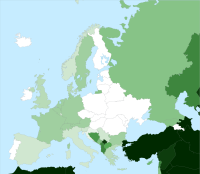
Photo from wikipedia
This article examines how social identification and group networks, and their interactions, affect Moroccan and Turkish immigrants’ political participation in the Netherlands. It uses the data generated by Roex et… Click to show full abstract
This article examines how social identification and group networks, and their interactions, affect Moroccan and Turkish immigrants’ political participation in the Netherlands. It uses the data generated by Roex et al. (Salafisme in Nederland. IMES Report Series, Institute for Migration and Ethnic Studies (IMES), Amsterdam, 2010) and conducts logistic regression analyses. It conceptualizes how social identifications, networks, and their interactions relate to voting, other institutionalized political participation, and noninstitutionalized political participation separately. Our main finding is that immigrants’ origin-country identification affects voting turnout negatively, but other forms of political participation positively, for those who are more embedded in origin-country friend networks, and who visit the mosque more frequently. A difference between the two immigrant groups appears when we consider religious identification and networks. Religious identification has mostly positive effects on the political participation of Moroccan immigrants who are also embedded in religious networks, while it has solely negative effects among Turkish immigrants who are more embedded in religious networks.
Journal Title: Acta Politica
Year Published: 2018
Link to full text (if available)
Share on Social Media: Sign Up to like & get
recommendations!